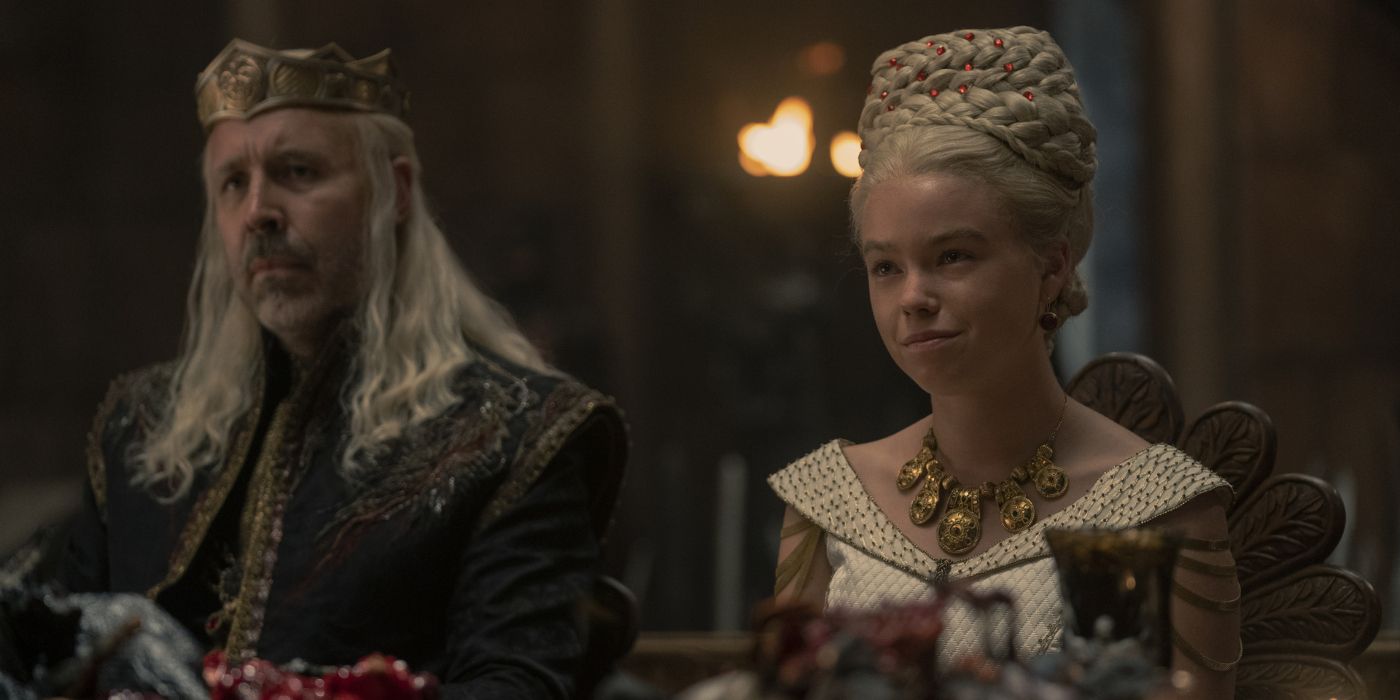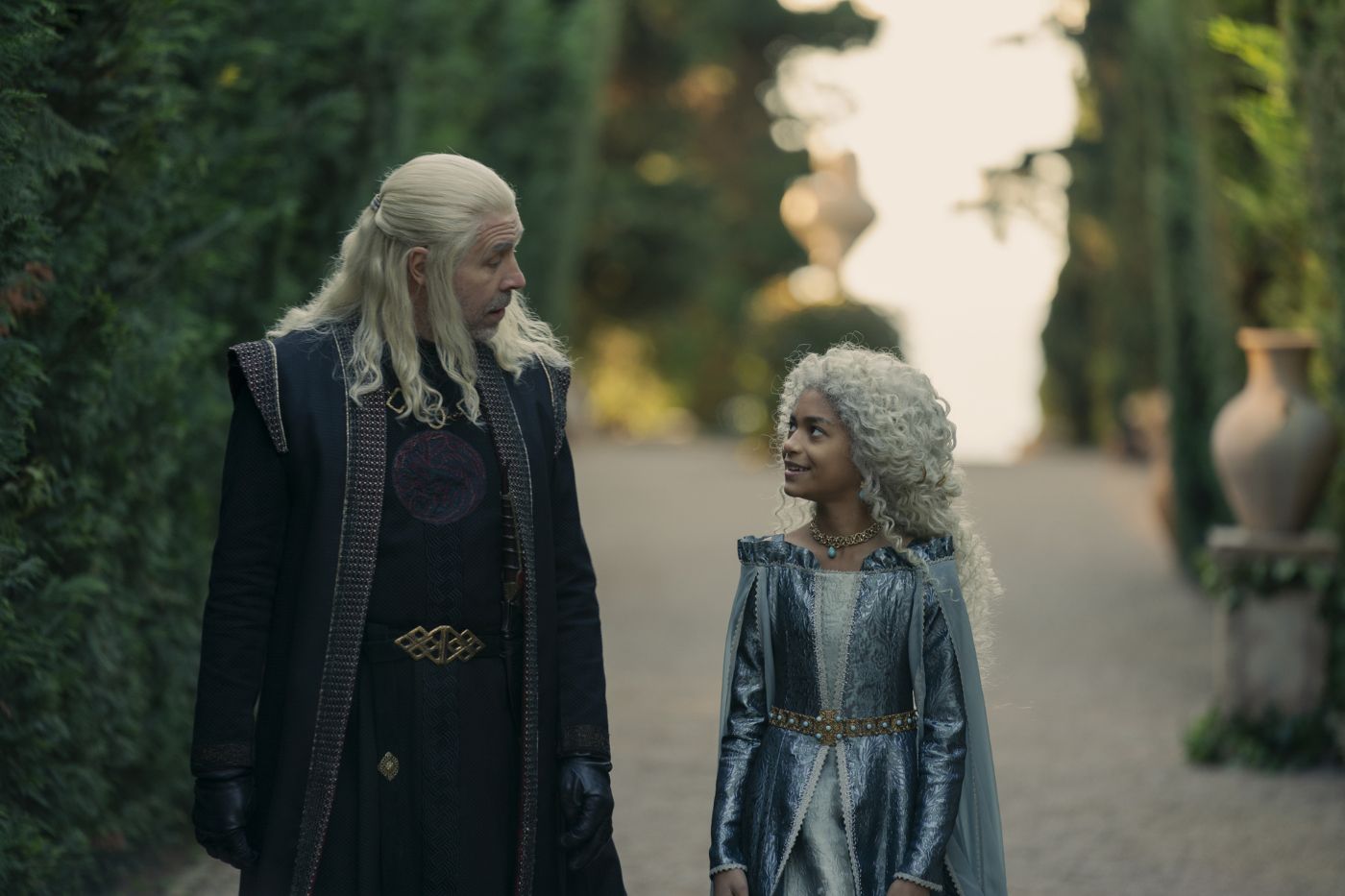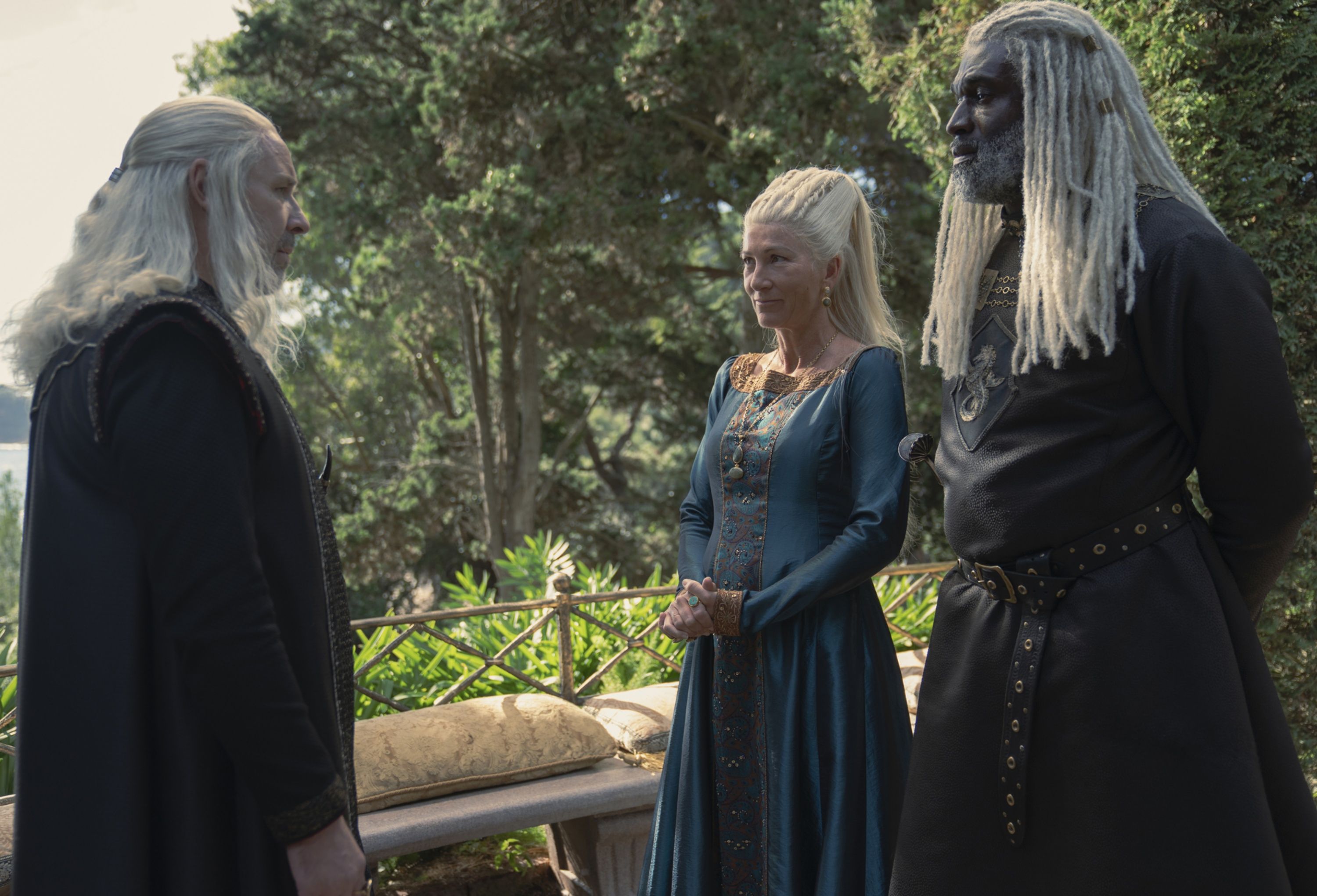Editor's note: The below contains spoilers for Episode 1-5 of House of the Dragon.In House of the Dragon’s fifth episode, "We Light the Way," some major steps are taken toward the future of the Targaryen dynasty. A scene takes place between Viserys (Paddy Considine) and Corlys (Steve Toussaint), and they decide that their children, Rhaenyra (Milly Alcock) and Laenor (Theo Nate), will get married. Yet, there are details of the arrangement that remind us that our world is not as different from this seemingly antiquated society as we may think. This scene proves that making one decision as king created a domino effect that destroys many more patriarchal rules.
We often talk about “smashing the patriarchy” and all the things that come with it, but we can acknowledge that we’re not talking about living in a society where you’re likely to be forced to marry your infant brother. Dismantling the patriarchy is positive regardless of what roadblocks it’s presenting us with, but that doesn’t mean we’re faced with the same struggles that Rhaenyra is… right? House of the Dragon isn’t set during any actual historical moment in time (there are too many mentions of dragons for that) but it’s clearly modeled after real, ancient ways of life. With the treatment of women and talk of relationships that can be hard to imagine and some leech-laden moments that highlight a desperate lack of modern medicine, it’s clear that there's a pretty sizable separation between the society within House of the Dragon and our own.
In an attempt to maintain power and preserve a dynasty, there are conversations that go on and are normalized in House of the Dragon that would be completely taboo and totally out of the question in our modern reality. For example, it’s suggested that Rhaenyra should be betrothed to her infant brother, then later to her uncle, and ultimately, it’s decided by a third party that she will marry her cousin. It’s also strongly urged that Viserys marry a child. These ideas are as bizarre to most viewers as they should be, and this acts to make us believe that this fictional society is antiquated, barbaric, and far from our own.
In the context of the series, though, it's clear from these conversations that the preservation of their dynasty in both the literal and the emblematic ways is of the utmost importance. When Viserys and Corlys meet to discuss a potential wedding between Rhaenyra and Laenor, it seems, at first, that this is going to be an agreement that works for both parties. An arrangement that appeases everyone would be welcome – especially since Viserys hasn’t been one to make many decisions that others seem to easily agree with.
Yet, the meat of this scene and the conflict presented by the potential arrangement are brought about when one seemingly innocuous detail is raised. Corlys wants to know whose last name Rhaenyra and Laenor’s future children will take. Traditionally, of course, the couple would take Laenor’s name, Velaryon, since women take their husband’s last name. However, there is nothing traditional about the situation, since Rhaenyra is the first ever woman in line for the throne.
Of course, Corlys wants to stick to tradition, because it is in his own best interest. Viserys, on the other hand, asks if Corlys really thinks that the Targaryen dynasty should end because of what is ultimately a pointless tradition. Rhaenyra’s position as heir is unprecedented, and as a result, so is the question of whose last name the future heirs will take. But, what seems like a simple question is actually a heavy one. Truthfully, arguing over the name seems like a petty reason to throw a wrench into an otherwise agreed-upon plan for two peoples' lives. It really isn't, though. Sometimes just because something is just a symbolic gesture doesn't mean it's not important, and for Viserys and Corlys, this is clearly the case. Their legacy and family tree shouldn't depend upon their children's last name, but the dynasty does.
Most of us aren't worried about our family's dynasty, but of course, the tradition that in a heterosexual marriage, a woman typically takes her husband's last name, exists in our real society. Surely plenty of people choose against this, but it is the tradition. While the stakes are very different in the Targaryens’ case than they tend to be in reality, there are fewer differences than we may think. We’re led to believe that there are so many elements that make the world of House of the Dragon distant and removed from our own, but this notion is shattered with what should be a tiny, almost insignificant detail of Viserys and Corlys’s arrangement. The patriarchy is the patriarchy either way, and while most of our fathers aren't locked in a room deliberating about marrying us off to our cousin, there are still some things that never seem to change.
Ultimately, traditions are always upheld by people who have an ulterior motive for upholding them. People seldom care about maintaining antiquated traditions unless it's somehow in their own best interest. We see this repeatedly in modern society, and we see it with Corlys' desire to stick to tradition and have Rhaenyra take the Velaryon name.
This is why having a leader like Viserys is as elusive as it is positive. Of course, this most recent ripple effect of Viserys's tradition crushing is also likely only happening because it is in his best interest. He wants his own last name to continue to be the one in power for generations to come. At least, though, he seems to stand up for what he believes is right even if it may not be. He didn't choose the heir he didn't believe in just because it was traditional or because it was in his best interest to appease those around him. He chose who he believed to be the right heir to protect his people even after he is gone. Viserys's position of power allowed him to buck tradition, and in doing so, the dominoes of traditions will keep falling as a result. Now not only does he have the first ever woman heir, but he's fighting for her husband to take her last name. That's about as much patriarchy-smashing as we could expect from someone who is the literal patriarch.



